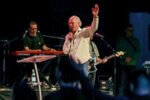Over 2 billion people who profess belief in Christianity each Sunday gather all over the world to worship God. It is a remarkable occurrence that should make us think and give pause over the significance of such a united event weekly. Just imagine in your mind when praying and bowing the head, when lifting up your hands or voice in worship: You are at the same time joining countless other believers at that very minute in the same worship of our Risen Lord.
It all goes back to apostles who walked the dirt trails of Israel with a radical rabbi who taught with “authority,” not like the scribes. Jesus did not institute verbatim the Lord’s Day, or command His disciples to gather on the first day of every week with significance and purpose. He rather followed the custom of His day in attending the synagogue services along with other devout religious of the day.
It was not until after the Messiah was resurrected and had ascended that the apostles—in many cases no longer accepted in the synagogues—by the direction of the Holy Spirit encouraged the weekly gathering of disciples of Jesus. Why did they meet and gather? It was simple: to remember the Lord.
Now, in the 21st century, we unfortunately gather for so many different reasons other than our Lord alone. Churches when they lose focus on the Lord Himself start to gear towards anything else. Sadly, we have churches that meet primarily for self-help lessons, or moral lessons, even to learn how to be rich. Some gather to hear the famous preacher or teacher, others just like the sound of the music. The reasons can be manifold. It is without question that there is a desperate need to re-evaluate why we gather as believers and again find the significance of our coming together.
Let us take into consideration some interesting facts about how early Christians gathered, maybe make a comparison with our local church and consider the difference:
1. The Lord’s Day
That is what it was called, when believers gathered. It was not their day or a day to do what you wanted but it was a day to remember Jesus Christ and specifically his death and resurrection. Maybe we need to recover the early Christian way of calling it not “Sunday” but rather, “the Lord’s Day.” We see this biblical reference with St. John who was on Patmos, “I was in the Spirit on the Lord’s Day” (Rev. 1:10).
2. Unified
Early Christians were unified in what they did in their church services. They repeated the same creeds together and make public declarations together, much like all other churches in their time. Phrases in the New Testament like, “Jesus is Lord” (Rom. 10:9, 1 Cor. 12:3) were declared together in unison. Pre-New Testament creeds in the New Testament (Phil. 2:6-11; 1 Tim. 2:5, 3:16) were recited. And early on, the Apostles’ Creed, and later, the Nicene Creed were written in order to summarize our Biblical faith simply and powerfully.
3. Scripture
Their church services were full of Scripture. They had what was called “Scripture Readings” where large portions of the Scriptures were read, even entire epistles were read aloud in one sitting. This followed the synagogue fashion of worship and reverence for God’s Words. St. Paul exhorted Timothy to “devote yourself to the public reading of Scripture” (1 Tim. 4:13a, NASB). See also 1 Thessalonians 5:27 and Colossians 4:16. Early Christian Tertullian said, “We meet together in order to read the sacred texts.”
4. Prayer
Corporate prayers were offered at times. Early believers saw themselves as one before God in their worship and prayers. We see that example in Acts 4: When they had been released, they went to their own companions and reported all that the chief priests and the elders had said to them. And when they heard this, they lifted their voices to God with one accord” (Acts 4:23-24a). The apostles kept the hours of prayer three times a day practiced by the Jewish synagogue, temple worship system. Prayers were prayed aloud, at times very general prayers for all believers at once or for all of lost humanity. See Jesus’ prayer in John 17, where he prayed for all who would believe on Him.
5. Cloud of witnesses
A radical understanding in early Christian thought was the awareness that the believers were not alone. This meant to them there were holy angels observing the worship and not only observing, but worshipping with them. Even more radically, they believed when they were gathered on the Lord’s Day, they were gathered not just with the local believers they could see, and not just with all other believers who were worshipping at the same time in other physical locations. They understood that as they entered into worship they were entering into the heavenly throne room, which is eternal, to join the worship of all believers at all times, including the worship that is constantly going on in heaven. See Revelation 5 and Hebrews 12:1.
6. Communion
Called many different names by various Christian groups throughout the history of the Church, the practice of the Lord’s Supper was observed weekly with great significance and reverence. They called it “Eucharist” early on, which means “Thanksgiving” in Greek. It was a time to, in holy reverence, thank Jesus for His death on the cross—and they believed His words that it was His flesh and blood (See John 6). Early believers called it a mystery, and just knew it was a special thing they were instructed to do by our Lord. “We call this food Eucharist, and no one else is permitted to partake of it, except one who believes our teaching to be true and who has been washed in the washing which is for the remission of sins and for regeneration [in other words, has received baptism]” —Justin Martyr (A.D. 150).
7. The Virgin Mary
The early Christians put great importance on the role Mary played in our salvation. Most false teachings in the early church came under the broad brush of Gnostism, which meant people denied the belief of the incarnation of Jesus in Mary’s womb. Therefore, early believers put a strong emphasis on Christ being manifested in the flesh and being born “of” the virgin Mary. The word theotokos was given to Mary as a title, which means in Greek, “God-bearer.” It was actually the word used to refute a large heresy in the fourth century. Jesus was God in the flesh in her womb; therefore, it was said that she bore God. This was beyond important to be clarified and believed upon. Irenaeus, an early church bishop and disciple of the apostle John, said “By obeying, she became a cause of salvation for herself and for the whole human race.” Finally, Martin Luther of the Reformation said: “she had a child by the Father in heaven, and such a Child. … Hence men have crowded all her glory into a single word, calling her the Mother of God.”
As we seek to be led by the Holy Spirit in our modern worship services, let us not forget to look back as we move forward, declaring an ancient faith to a modern world. {eoa}
Greg Gordon is founder of SermonIndex.net.







Leave a Comment
You must be logged in to post a comment.